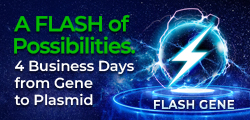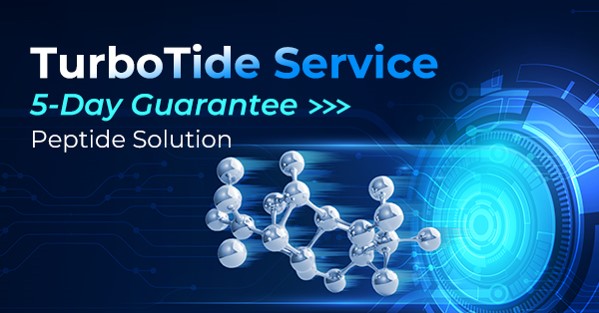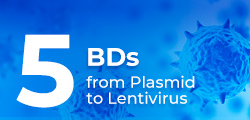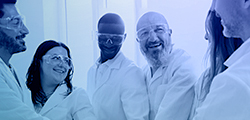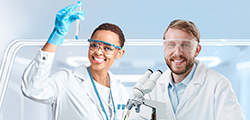-
REAGENT SERVICES
Hot!
-
Most Popular Services
-
Molecular Biology
-
Recombinant Antibody/Protein
-
Reagent Antibody
-
CRISPR Gene Editing
-
DNA Mutant Library
-
IVT RNA and LNP Formulations
-
Oligo Synthesis
-
Peptides
-
Cell Engineering
-
- CRISPR/Cas9 sgRNA
- CRISPR/Cas12a crRNA
- Prime Editing Guide RNA
- Base Editing Guide RNA
- HDR Templates
- gRNA + HDR Template Design Tools
- cGMP Guide RNA
- cGMP HDR Templates
- CRISPR/Cas Proteins
- CAR-T Knock-in Optimization Kit
- CRISPR Plasmids
- CRISPR gRNA Plasmid Libraries
- CRISPR Cell Lines
- Microbial Genome Editing
-
-
PRODUCTS
-
Most Popular Reagents
-
 Instruments
Instruments
-
Antibodies
-
ELISA Kits
-
Protein Electrophoresis and Blotting
-
Protein and Antibody Purification
-
Recombinant Proteins
-
Molecular Biology
-
Stable Cell Lines
-
Cell Isolation and Activation
-
 IVD Raw Materials
IVD Raw Materials
-
 Therapy Applications
Therapy Applications
-
Resources
-
- Pharmacokinetics and Immunogenecity ELISA Kits
- Viral Titration QC ELISA Kits
- -- Lentivirus Titer p24 ELISA KitHot!
- -- MuLV Titer p30 ELISA KitNew!
- -- AAV2 and AAVX Titer Capsid ELISA Kits
- Impurity Test ELISA Kits
- -- BSA ELISA Kit, 2G
- -- Cas9 ELISA KitNew!
- -- Protein A ELISA KitNew!
- -- His tagged protein detection & purification
- -- dsRNA ELISA Kit
- -- Endonuclease ELISA Kit
- COVID-19 Detection cPass™ Technology Kits
-
- Automated Maxi-Plasmid PurificationHot!
- Automated Mini-Plasmid PurificationNew!
- PCR Reagents
- S.marcescens Nuclease Benz-Neburase™
- DNA Assembly GenBuilder™
- Cas9 / Cas12a / Cas13a Nucleases
- Base and Prime Editing Nucleases
- GMP Cas9 Nucleases
- CRISPR sgRNA Synthesis
- HDR Knock-in Template
- CRISPR Gene Editing Kits and Antibodies
-
![AmMag™ Quatro Automated Plasmid Purification]() AmMag™ Quatro automated plasmid purification
AmMag™ Quatro automated plasmid purification
-
![Anti-Camelid VHH]() MonoRab™ Anti-VHH Antibodies
MonoRab™ Anti-VHH Antibodies
-
![ELISA Kits]() ELISA Kits
ELISA Kits
-
![Precast Gels]() SurePAGE™ Precast Gels
SurePAGE™ Precast Gels
-
![Quatro ProAb Automated Protein and Antibody Purification System]() AmMag™ Quatro ProAb Automated Protein and Antibody Purification System
AmMag™ Quatro ProAb Automated Protein and Antibody Purification System
-
![Target Proteins]() Target Proteins
Target Proteins
-
![AmMag™ Quatro Automated Plasmid Purification]() AmMag™ Quatro automated plasmid purification
AmMag™ Quatro automated plasmid purification
-
![Stable Cell Lines]() Stable Cell Lines
Stable Cell Lines
-
![Cell Isolation and Activation]() Cell Isolation and Activation
Cell Isolation and Activation
-
 IVD Raw Materials
IVD Raw Materials
-
![Quick
Order]() Quick Order
Quick Order
-
![Quick
Order]() Quick Order
Quick Order
- APPLICATIONS
- RESOURCES
- ABOUT US
- SIGN IN My Account SIGN OUT
- REGISTER

![Amino Acid Code Amino Acid Code]()
Biology Terms Dictionary
This Biology terms dictionary provides query services for biology and biochemistry terms. Please enter the biology or biochemistry terms you want to search.
List by Alphabet: A B C D E F G H I J K L M N O P Q R S T U V W X Y Z
cell transplantation
Cell transplantation is a medical procedure in which cells are transferred from a donor to a recipient for the purpose of replacing or repairing damaged tissues or organs. This therapeutic approach is a key aspect of regenerative medicine and tissue engineering. Cell transplantation holds promise for treating a wide range of diseases and conditions, including those where organs are damaged or dysfunctional. Here are the key aspects of cell transplantation:
1. Types of Cells Used: Various types of cells can be used for transplantation, including stem cells (both embryonic and adult stem cells), induced pluripotent stem cells (iPSCs), organ-specific cells (like hepatocytes for liver repair), and immune cells (for cancer immunotherapy).
2. Stem Cell Transplantation: One of the most common forms of cell transplantation involves stem cells, which have the ability to differentiate into various cell types. This includes bone marrow transplants, which are routinely used for treating blood disorders like leukemia.
3. Regenerative Medicine: The goal of regenerative medicine is to repair, replace, or regenerate cells, tissues, or organs to restore or establish normal function. Cell transplantation is a critical tool in this field.
4. Tissue Repair and Organ Replacement: Cell transplantation can potentially repair damaged tissue (e.g., heart muscle after a heart attack) or replace whole organs (e.g., a failing pancreas in diabetes).
5. Immunological Challenges: One of the major challenges of cell transplantation is avoiding immune rejection. The recipient's immune system may recognize the transplanted cells as foreign and attack them. To overcome this, immunosuppressive drugs are often used, and matching donor and recipient tissue types is critical.
6. Sources of Cells: Cells for transplantation can come from various sources, including the patient (autologous transplantation), a donor (allogeneic transplantation), or, in some cases, from animal sources (xenotransplantation).
7. Clinical Trials and Research: Many cell transplantation approaches are still experimental and are being tested in clinical trials. This research is crucial for determining the safety and effectiveness of these treatments.
8. Ethical and Regulatory Considerations: Cell transplantation, especially when involving embryonic stem cells or genetically modified cells, raises ethical and regulatory issues. These procedures are subject to strict regulations and ethical guidelines.
9. Applications: Beyond treating blood cancers, cell transplantation shows promise for a variety of conditions, including Parkinson's disease, spinal cord injuries, diabetes, and heart disease.
10. Technological Advances: Advances in tissue engineering, such as the development of scaffolds for cell growth and the use of bioprinting technologies, are enhancing the effectiveness of cell transplantation.
Cell transplantation represents an exciting and rapidly evolving field, offering potential new treatments for a range of diseases that are currently difficult to manage with conventional therapies. As research progresses, it holds the promise of transformative healthcare solutions.
- Tags:
- Molecular Biology
Related Biology Tools
-
GenSmart™ Codon Optimization
GenSmart Optimization is a free online tool for performing codon optimization to improve gene expression. GenScript's patented algorithms are integrated into the tool to optimize the computing capability of high-performance sequence generation.
-
DNA Construct Design Tool
GenSmart™ Design is a free online DNA construct design tool developed by GenScript. GenSmart™ Design has two design modules, the Create Construct module for individual plasmid design and the Create Library module for DNA library design.
-
Codon Frequency Tables
This online tool shows commonly used genetic codon frequency table in expression host organisms including Escherichia coli and other common host organisms.
Service and Products

Gene Synthesis
Offer gene synthesis of 100% sequence guarantee, free codon optimization, DNA synthesis in as fast as 4 days.

ORF cDNA Clones and Custom Clones
Largest commercial ORF clones database, 70,000 next-day shipping ORF clones.

Plasmid DNA Preparation
High quality plasmids supported by fully-automated platform, 100% full insert sequence accuracy guaranteed.

Express Cloning & Subcloning
$49 and 2 day turnaround, choose from over 150 IP FREE vectors.

Mutation and Library Services
Mutagenesis Portfolio offers several mutation and library services to meet various customers’ needs.

Oligo Synthesis
Bridge the gap between chemically synthesized oligos and bological applications.
-
Top Search
-
Hot Glossary
-
Antibody
If you know of any terms that have been omitted from this glossary that you feel would be useful to include, please send detail to the Editorial Office at GenScript: website@genscript.com
If your term is adopted, we will send 1,000 EzCoupon points to your GenScript account.
-
